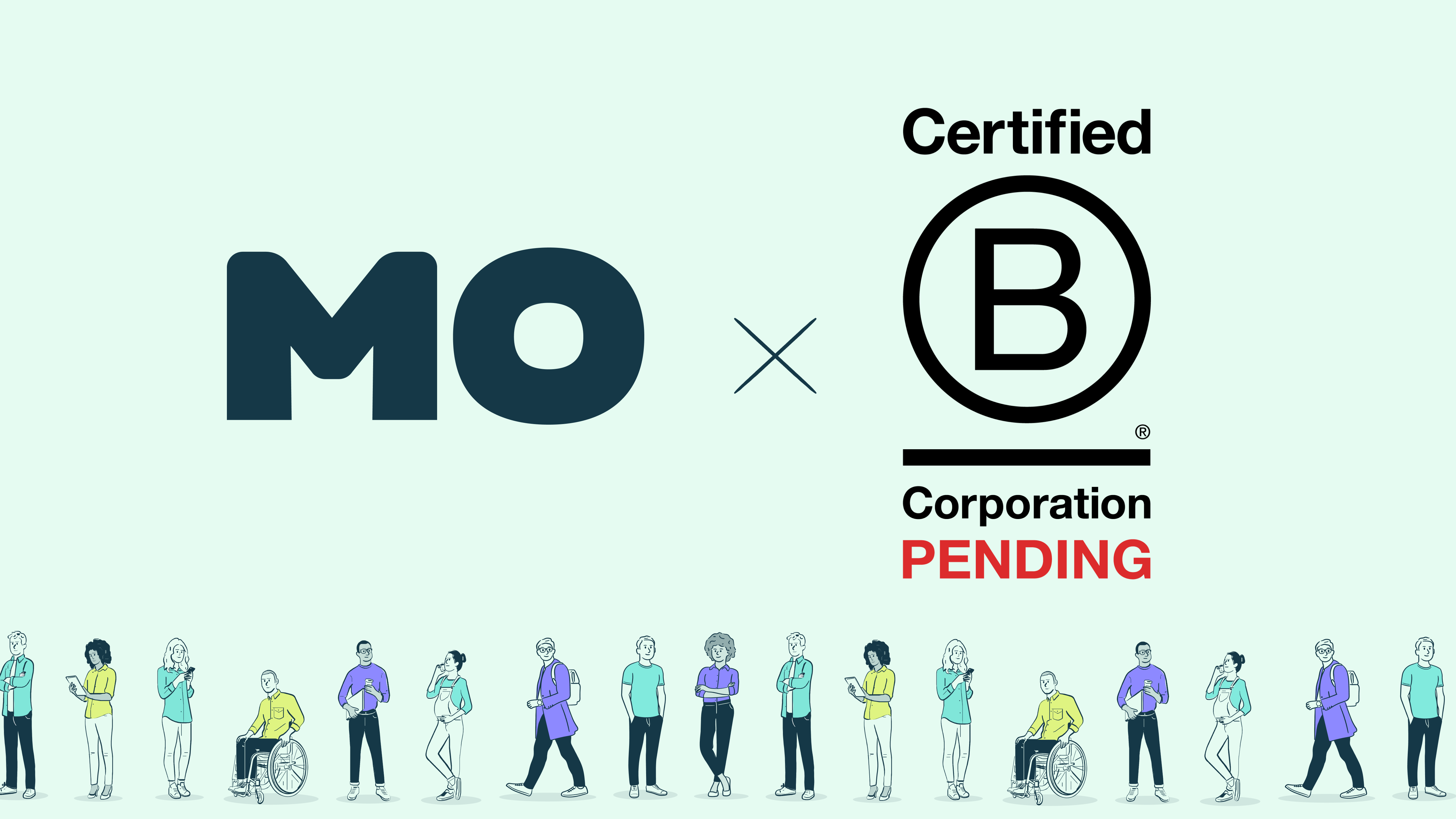What is the B impact Assessment about?
What is a B corp?
B Corporations (short for Benefit Corporations) are businesses that have proven, via the rigorous B Corp certification process, that they use business as a force for good. B corp companies have proven that their ways of working are socially and environmentally conscious according to metrics set by ‘B Labs’.
The certification process begins with an initial self-assessment, the ‘B-Impact assessment’, during which questions are asked about the company’s current ways of working. The average initial self-assessment B impact score is 50.9 points, and 80 points are required to certify as a B corp.
Following the initial assessment, a company must then work to improve its score by adhering to more of the guidelines, tips, and ways of working that B Labs approves. Points improvements come in the shape of, for example, having a company code of ethics, committing a certain proportion of revenue to charity, tracking and setting improvement targets for diversity and inclusion, and even improving positive outcomes on the climate or community.
Understanding the B Impact Assessment.
The B impact assessment can initially seem very daunting. On first log-on to the assessment portal you are immediately few questions pertaining to your business, such as company type and industry, headquarters location and company size. These questions determine what question set is asked – and so businesses in different sectors (i.e., manufacturing, agriculture, wholesale/retail, services) will be shown different question sets.
Next, you reach the assessment portal where you’re confronted with 6 individual quizzes based on the 5 impact areas and one disclosure questionnaire.
Having entered into the B impact assessment process entirely blind at the beginning of our journey, Mo.health aim to answer the questions that we had upon first completion of the assessment for others to benefit from.
As Mo.health is a ‘service with minor environmental footprint’ according to B labs’ categorisation – our description of questions pertains to the question set we are shown as a result of describing in this way.
What is the B impact assessment?
The B impact assessment is a digital tool created by B Labs to allow companies to evaluate how they perform in five areas relating to positive social and environmental outcomes.
What questions are asked in the B impact assessment?
The questions are based around five core themes of: governance, customers, workers, environment and community.
Deconstructing the five impact areas within the B impact assessment.
1. Governance
The questions on governance pertain to the company’s mission, ethics, and transparency. Effectively, this set of questions seeks to determine what structures are in place within the business. The section rewards businesses that are driven by creating positive impact (e.g., Stating a desire to create positive social or environmental outcomes in an agreed mission statement), businesses that engage all kinds of stakeholders, and those that have robust ethics policies in place (e.g., Code of ethics and whistleblower policies). There are 18 questions in total within this section and a total of 15 points are available.
2. Workers
The questions within the workers section seek to gather information regarding the treatment of employees within a company. The assessment asks about all matters relating to employees’ health and safety, wellness, career development, engagement and satisfaction, and financial security. Questions range from those with more quantitative answers such as #Full/Part-time/Temporary workers, % Employees paid various living wages, and finally more qualitative questions pertaining to employee professional development and satisfaction and the benefits sets offered to employees. This is the joint highest-scoring section with 50 points total available here across 29 individual questions.
3. Community
Next, the community section of the assessment assesses the impact the company has on the communities in which it operates, hires from, and sources from. The section includes a great amount of detail including questions around supply chain management and civic engagement – as well as asking about the diversity, equity, & inclusion policies present in the company. Questions reward companies with more D,E,&I policies in place, as well as those that source locally and give charitably. Effectively, the greater a positive impact a company has on its community the greater its score will be. There are 26 questions in this section and 50 points available here.
4. Environment
The environment section of the assessment seeks granular detail of the company’s environmental practices. With questions on the various environmental areas such as air&climate, water, and land – as well as asking about the company’s business model and office practices. ‘Greener’ companies score more highly on this section. Notably, this section rewards virtual office stewardship, in the form of having policies in place to guide employees in home offices. From 15 questions, 20 points are available here.
5. Customers
The final points-scoring section of the assessment is the ‘customers’ section. The section begins with some introductory questions about your customers, which then determine which further questions you are asked. A maximum of 5 points can be gained from this section. As Mo.health the questions we’ve been asked in this section pertain to health and wellness improvement, but the suite may be different for other business models and will change depending on whether you have an impact business model.
Mo.health’s B Corp process
Why do we want to be a B corp?
We wrote in detail about why a company may make the decision to become a B corp here.
But why did we, as Mo.health, decide to begin the process of gaining our B Corp certification?
Mo.health is, at its core, about providing its members with access to healthcare. Trust is vital in achieving this big mission. We’re also aware of how business can be an influential tool of change in the world, but that it is often not used as such.
As such, pursuing our B Corp certification was a no-brainer for us. We think that the B Corp certification is the most clear-cut way to show, rather than merely tell, the world about what kind of company we are and want to be.
It is clear to us that becoming a fully certified B corp is not a question of ‘if’, but rather one of ‘when’. Being part of a fantastic community of like-minded businesses using business as a force for good is an aspiration we will work to achieve.
Mo.health’s initial B Impact Assessment
So we dove right in and did our initial B impact assessment without a second thought. We answered questions based on the state of the company at the present moment and came out with a score of 61.7. We were glad to see our score sitting above average – but we know there is still a lot of work to be done to meet and exceed the 80 points threshold.
Successes
We consider our initial B impact assessment result a resounding success. Surpassing the average first B impact assessment score by more than 10 points is a huge victory for such an early-stage business.
Some of our more specific initial success with regards to points achieved came from the very nature of our business.
Within the worker’s section of the assessment, you are asked about the health and wellness of your employees. Specifically, whether team members are offered supplementary health cover. As a provider of health cover for small businesses, Mo.health naturally provides 100% of our employees with Mo.health. We gained 10 points for this, which we’re incredibly proud of.
In addition, the assessment asks about net job growth rate in the past 12 months. As a young company, we have had a net growth rate that meets the highest criteria for the B impact assessment, and so scored full marks on this question too.
Areas for improvement
Many of our missed points came from the fact that, as a very young company, we lack the process and document infrastructure that the B impact assessment discusses. We did not, for example, have a written code of ethics, whistleblower policy, professional development policy, or diversity improvement goals. But we had ideas and norms in place ahead of the assessment but had not yet formalised them.
We knew, however, that we did want to implement these policies in a more formal manner, and so we would be able to gain points easily by creating and cementing these internal policies.
As such, our next step is to work on improving our score. We will be documenting our process of score improvement on our blog here… We’d love to build a community of B-Corps and pending B-Corps.
Conclusion
In conclusion, becoming a B Corp is a rigorous process that requires companies to prove their commitment to social and environmental responsibility. The B Impact Assessment is a tool that helps businesses evaluate their impact in five key areas: governance, workers, community, environment, and customers. While the assessment can be daunting at first, it provides a clear roadmap for companies to improve their practices and become certified B Corps.
At Mo.health, we have already made significant progress in our journey towards certification, and we are committed to sharing their process with others in the community. By working together, businesses can use their collective power to create positive change in the world.




